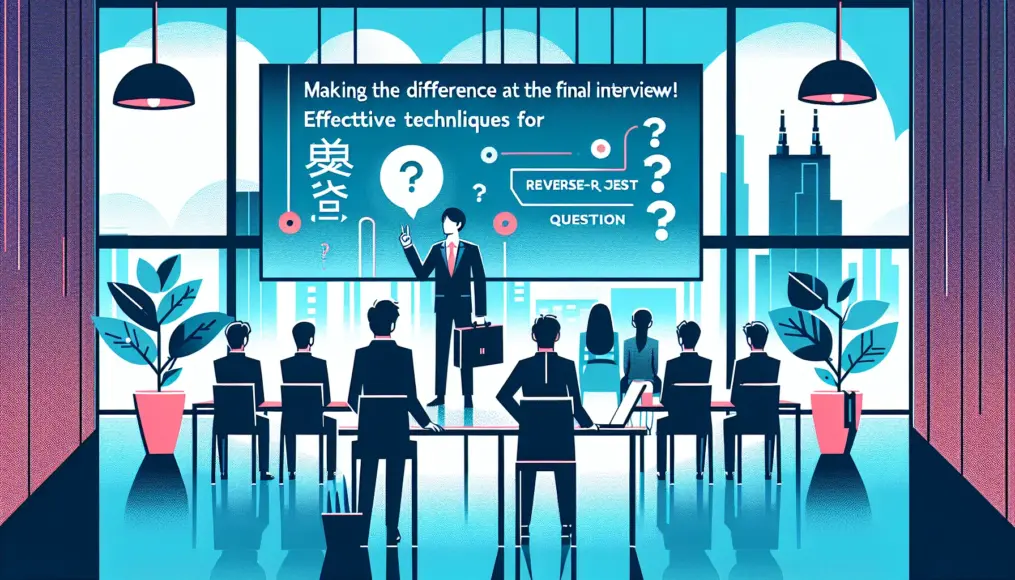The final interview is a pivotal moment in your job search. Did you know that the questions you ask at this stage can significantly influence the impression you leave on your interviewers?
Asking insightful questions isn’t just a way to confirm the interviewer’s perspectives; it’s also a fantastic opportunity to showcase your own strengths and interests. So, take the time to prepare effective questions that will help you stand out during your final interview.
- Understanding the impact of your questions on interview evaluations
- Steps to develop effective questions to ask
- Questions to avoid and the reasons behind them
The Importance of Asking Questions in Final Interviews
Asking questions during your final interview plays a crucial role in your job search. When done effectively, it can leave a positive impression on your interviewer. Demonstrating your interest and enthusiasm through these questions can significantly influence the outcome of your interview.
Why Asking Questions is Valued
The reason asking questions is so highly regarded is that it showcases your interest and understanding of the company. By inquiring about the organization or your potential career path, you convey how seriously you are considering the position. Moreover, since these questions are typically posed at the end of the interview, they tend to leave a lasting impression.
Through your questions, you have the opportunity to express your thoughts and values, making it a positive factor for the interviewer as well. Additionally, the answers you receive can help you gain insights into the company culture and work environment. If you’re interested, check out common questions asked during final job interviews! Preparation tips for success.
- Asking questions is a chance to demonstrate your interest and understanding
- It can help leave a positive impression on the interviewer
- It aids in understanding the company culture and work environment
The Impact of Your Questions on Interview Outcomes
The questions you ask can have a direct impact on your interview results. Interviewers use your inquiries to assess how well you might fit within the company. If your questions are well-thought-out, it increases the likelihood that you’ll be seen as a candidate who can thrive in that role.
Additionally, the content of your questions may provide the interviewer with memorable stories or topics to discuss, enhancing your communication with them. Ultimately, this could increase your chances of being hired.
- Your questions can influence the interviewer’s evaluation
- Thoughtful questions leave a lasting impression
- They can deepen communication with the interviewer
Steps to Craft Effective Questions for Your Interview
As you approach the final interview, asking insightful questions is a crucial aspect of your job search. To create effective questions, it’s essential to thoroughly understand the company. Based on this information, you can formulate questions that align with your interests and career vision, allowing you to showcase your enthusiasm and suitability to the interviewer.
Leveraging Company Research for Your Questions
Conducting thorough research on the company will provide you with a solid foundation to develop specific questions. By reviewing the company’s official website, news articles, and industry trends, you can gain insight into the company’s culture and goals. This information can lead to questions like, “What values are prioritized in this company?” or “How do you see the industry evolving in the near future?”
Understanding the company’s recent projects and initiatives is also vital. For instance, asking, “What challenges did you face with your recent projects?” demonstrates your interest and can lead to a more engaging conversation with the interviewer. If you’re interested, check out Techniques for Impressive Reverse Questions in First Interviews! for more insights.
- Check the company’s official site and news sources
- Understand the company culture and goals
- Think of questions related to recent projects
Examples of Questions That Move the Interviewer
When brainstorming reverse questions, aim for those that resonate with the interviewer. For example, asking, “What skills are essential for success in this role?” conveys your serious commitment to the position. Additionally, a question like, “Can you tell me more about the team dynamics and work culture?” provides a great opportunity to express your interest in the workplace environment.
Moreover, expressing your career vision and desire for growth through your questions can be impactful. By asking, “What does the career path look like within the company?” you can demonstrate your interest in a long-term commitment to the organization.
- Ask about the skills needed for success
- Inquire about the team’s atmosphere and working style
- Show your growth ambition with questions about career paths
How to Showcase Yourself Through Reverse Questions
The final interview is a prime opportunity to showcase yourself through reverse questions. By using these questions effectively, you can convey your enthusiasm and values to the interviewer. In this section, we’ll explore the connection between self-promotion and reverse questions, and how to articulate your career vision through them.
The Connection Between Self-Promotion and Reverse Questions
Reverse questions are closely linked to self-promotion. While self-promotion involves sharing your strengths and experiences, reverse questions allow you to substantiate those strengths. For instance, asking, “How do you think my experience could contribute to this project?” directly illustrates how your skills and background can benefit the company.
Moreover, reverse questions serve as a platform for expressing your individuality and personality. By sharing the values you hold and the work style you prioritize, you give the interviewer a glimpse into who you are. This helps establish a stronger sense of compatibility with the company.
- Strengthen your self-promotion with reverse questions
- Clearly demonstrate your skills and experiences
- Express your individuality and values
Communicating Your Career Vision Through Reverse Questions
It’s also crucial to communicate your career vision through reverse questions. Consider asking questions that reflect your future aspirations and how you can contribute to the company’s growth. For example, asking, “What kind of growth can I expect by advancing my career in this position?” shows that you’re thinking long-term.
Additionally, inquiring, “What options are available for career paths within the company?” can help you envision your future there more concretely. This conveys to the interviewer that you are seriously considering your growth within the organization, leaving a positive impression.
- Convey your career vision through reverse questions
- Ask questions that reflect on growth and contribution
- Get help in visualizing your future within the company
For more detailed techniques and effective examples of reverse questions, check out 派遣面接で差をつける!逆質問で成功する秘訣.
Questions to Avoid in Your Final Interview and Why
As the final interview approaches, the opportunity to ask questions becomes a crucial moment to showcase yourself. However, not all questions are created equal; some can leave a negative impression on the interviewer. In this section, we’ll look at examples of questions that could backfire and tips on how to leave a positive impression.
Examples of Questions That Can Backfire
Some questions can come across as uncomfortable for the interviewer or reveal a lack of preparation on your part. For instance, asking, “Can you tell me about the salary and benefits?” might suggest that you’re more interested in the perks than the role itself. This kind of inquiry can give the impression that you’re primarily focused on what you can get out of the job rather than your interest in the company or the position.
Additionally, basic questions like, “What does this company do?” should definitely be avoided. This type of question makes it glaringly obvious that you haven’t done your homework on the company. Remember, your questions should demonstrate your interest in the interviewer and convey your enthusiasm for the position, so make sure to research these fundamental details beforehand.
- Avoid asking about salary and benefits first
- Questions that show a lack of knowledge about the company can leave a poor impression
- Make your questions reflect genuine interest in the interviewer
Tips for Avoiding a Negative Impression
When it’s your turn to ask questions, it’s essential to consider the interviewer’s perspective and circumstances. For example, if the interviewer seems busy or time is limited, avoid lengthy questions. It’s also wise to steer clear of overly negative inquiries or questions that prioritize your own needs.
Furthermore, being aware of the flow of the interview is crucial. Tailoring your questions to match the atmosphere can facilitate smoother communication with the interviewer. For instance, if the interviewer is discussing the company’s vision, asking something like, “Are there specific projects that align with that vision?” helps establish common ground and fosters a more engaging conversation.
To better understand the significance of asking the right questions, check out how to excel in job interviews: strategies and key points.
- Ask questions that consider the interviewer’s position
- Avoid negative or self-serving inquiries
- Tailor your questions to the flow of the interview
Conclusion
As you approach your final interview, asking insightful questions becomes a crucial aspect of your job search. Thoughtful questions allow you to showcase your enthusiasm and values, but it’s equally important to avoid certain pitfalls. By preparing the right questions, you can leave a positive impression on your interviewer and enhance your chances of being hired.
- Asking questions is a chance to demonstrate your interest in the interviewer and the company
- It’s an effective way to communicate your personal brand and career vision
- Understanding which questions to avoid and being mindful of potential issues is essential
Make the most of your opportunity to ask questions during the interview, and set yourself up for success in your job search! We encourage you to use this article as a guide to formulate your questions. If you have any comments or questions, feel free to reach out!



Comment